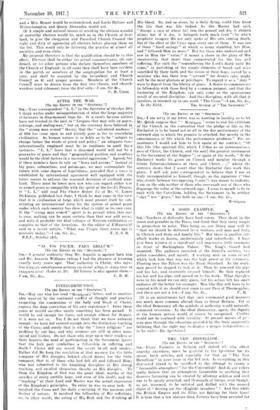INTERCOMMCNION.
[To THE EDITO1 or THE SPECT/701."1 Stn,—May one who has read emseeteeee',"letter, and is unutter- ably wearied by the continual conflict of thought and practice respecting the communion of the body and blood of Christ, express the deep conviction of his own experience ? After three years of untold sacrifice surely something has been gained. It world be sad enough for tears, sad enough almost for despair,
if it were not so. Yet I do not think that we have unlearnt enough : we hare not entered enough into the distinctive teaching of the Cress;iand surely that is why the "fancy religions" are profiting by our loss. and why sermons are still so often unin- spired end lifeless. Do not those who urge upon their readers or their bearers the need of participating in the Sacrament ignore that the holy part symbolizes .a fellowship in suffering and death ? Christ did' not reveal the secret to all and sundry. Rather did He keep the revelation of that mystery far the little company of His diseiples behind closed dooms; for the little company, that is, of those who bad left nil and followed Him; who had submitted to the humbling discipline of His strong teaching, and enrolled themselves thereby as His disciples. To them the Kingdom of God was the great ideal, worthy of the sacrifice of every earthly hope, and even of life itself; and the "teaching" of their Lord and Master was the actual expression of the Kingdom'e•prineiples. To enter in was no easy task. It involved the Cross and the daily crucifying of the passions and desires of nature. It involved the fellowship of His sufferings, or, in other words, the eating of His flesh and the drinking of
His blood. So, and so alone, by a daily dying, could they know the life that was life indeed. As the Master had amid, "Except a corn of wheat fail into the ground and die. it abideth alone; but if it die, it bringeth forth much fruit"—by which prophetic imagery He not only apoka of His own coming death, but of the effect of the Cross upon every one of them. It was one of those "bard sayings" at which so many stumbled, left Him, and " followed Him no more." But for those who understood and saw in Him the "value," it meant a share in the glory of His resurrection that more than compensated for the loss and suffering. For such the "remembering the Lord's death until lie come," in partaking of the simple elements of bread and wino sanctified by their faith and the vision of their hope, served by a minister who was their true " servant " for Jesuit's sake, might well be the most glorious of privileges. To regard it as a " duty " were to depart from the liberty of grace. A desire to communicate in fellowship with those fired by a common purpose, and that the hastening of the Kingdom, can only come as the spontaneous result of accepted discipline. Aud this discipline, with all that it involves, is summed up in one word, "The Cross."—I arn. Sir, dc.,


































 Previous page
Previous page